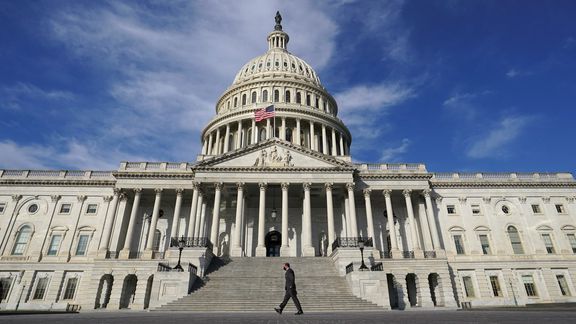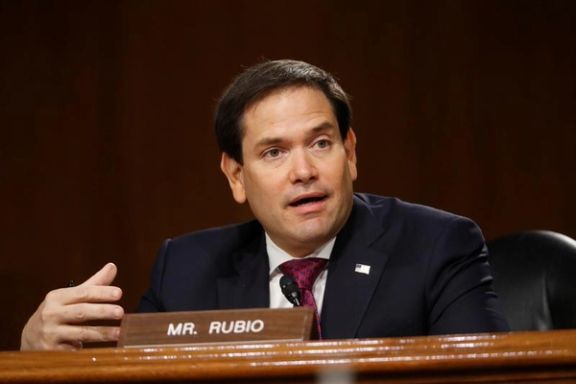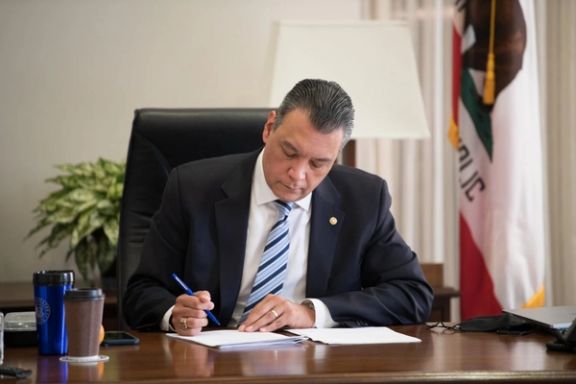Targeting Iran’s Leadership, MAHSA Act Introduced At US Senate

The bipartisan Mahsa Amini Human Rights and Security Accountability (MAHSA) Act has been submitted to the US Senate, seeking more sanctions on Iranian leadership.

The bipartisan Mahsa Amini Human Rights and Security Accountability (MAHSA) Act has been submitted to the US Senate, seeking more sanctions on Iranian leadership.
Following a unanimous approval at US House of Representatives Foreign Affairs Committee in April, Senators Marco Rubio (R-FL) and Alex Padilla (D-CA) introduced the bipartisan legislation to the Senate on Thursday, potentially tightening the noose on top leaders of the regime -- the Supreme Leader and the President as well as their inner circles – over human rights abuses and support for terrorism.
“The Ayatollah’s systematic human rights violations against the Iranian people are barbaric," Rubio said, underlining that “as a State Sponsor of Terrorism, the Iranian regime has actively wreaked havoc against its own people and countless other nations.”
The MAHSA Act – which has 68 Republican and 60 Democrat cosponsors – and is supported by the National Union for Democracy in Iran (NUFDI), United Against Nuclear Iran (UANI) and the American Israel Public Affairs Committee (AIPAC), was first introduced by Representatives Jim Banks (R-IN) and Eric Swalwell (D-CA) during the 117th Congress in January, about four months into pro-democracy and anti-regime protests following the death of 22-year-old Iranian-Kurdish woman Mahsa Amini at the hands of Iran's hijab police.

Essentially similar and a companion to the one passed in the House committee, the MAHSA Act will potentially commit the administration to report to Congress in 90 days after the date of the enactment and periodically thereafter, making determinations about whether certain existing sanctions apply to specified persons and impose the applicable sanctions.
“The US must evaluate and re-amp economic pressure against Senior Iranian regime officials who are actively partaking in the crackdown of Iranian protesters and civilians,” Rubio added in a statement.
Senator Padilla said, “Iranian protesters have demonstrated tremendous courage in voicing their outrage toward the Iranian regime after the brutal murder of Mahsa Amini,” noting that “we must do our part to hold Iranian leaders accountable for their violent crackdown of these protests and the regime’s ongoing repression, censorship, and abuse against its people.”

The bipartisan bicameral move requires the executive branch to impose applicable sanctions on Ali Khamenei, his office and his appointees, as well as President Ebrahim Raisi and his cabinet officials, foundations and other entities affiliated with the Supreme Leader under section 105(c) of the Comprehensive Iran Sanctions, Accountability, and Divestment Act of 2010, section 7031 (c) of the Department of State, Foreign Operations, and Related Programs Appropriations Act, 2021, and Executive Orders 13876, 13553, 13224, and 13818.
“The Supreme Leader is an institution of the Islamic Republic of Iran...that holds ultimate authority over Iran’s judiciary and security apparatus, including the Ministry of Intelligence and Security, law enforcement forces under the Interior Ministry, the Islamic Revolutionary Guard Corps (IRGC), and the Basij, a nationwide volunteer paramilitary group, subordinate to the IRGC, all of which have engaged in human rights abuses in Iran,” read a paragraph of the MAHSA Act.
Some lobbyists and a few lawmakers have been seeking to dilute the act, describing it as “Islamophobic” or “not leading to any increased sanctions” because Khamenei and Raisi were already sanctioned by the US. NIAC, advocating non-confrontational policies toward the Islamic Republic, said in a statement that “the bill would make it more difficult for a President to lift sanctions on these officials as part of any diplomatic agreement... This bill does not include a sunset and would target the offices themselves, rather than individuals. As a result, it would remain in effect indefinitely and be applied to any future Supreme Leader or President of Iran until its repeal."
Amini’s death in September 2022 led to the boldest revolt against the clerical regime since its establishment in 1979 in Iran in what became known as the Woman, Life, Freedom movement. More than 500 people have been killed in the nationwide rallies, nearly 20,000 detained, and seven executed on trumped up charges.